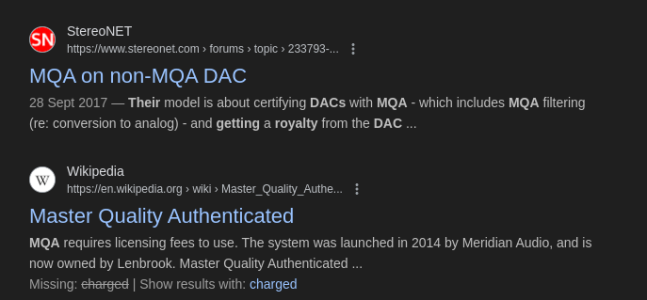sachinchavan 15865
Well-Known Member
But some users must have lost trust. They’d need to regain it.Yea let's see what they bring to the table. I doubt it will be complete hokum
But some users must have lost trust. They’d need to regain it.Yea let's see what they bring to the table. I doubt it will be complete hokum
Absolutely agree. Trust once lost is very hard to gain back.But some users must have lost trust. They’d need to regain it.
There was a royalty charged from DAC manufacturers to legally put the MQA logo on their dacs. So users did indirectly pay for MQA, regardless of whether they used it or not.The MQA finance- profit model depended on DAC manufactures and streaming services to decode-encode and stream music using MQA software. Pre MQA DACs could not do this.
Users did not directly pay for this. Can’t figure out how they charge the users. The HiFi industry (hardware and streaming services ) is definitely not paying for this.
So how does it make money from us if we opt to join the cult?

So that’s for the decoding software on DACs.There was a royalty charged from DAC manufacturers to legally put the MQA logo on their dacs. So users did indirectly pay for MQA, regardless of whether they used it or not.
View attachment 88227
It is not required since MQA Ltd collects a royalty for every commercial MQA-capable playback unit sold. MQA Ltd prohibits digital output of unpacked MQA in any digital format, only allowing the unpacked data to be fed to an on-board MQA-compatible DAC and output in analogue form. So if any streaming services that offers MQA, the decoding has to be ultimately done by the DAC and hence there is no need to again collect royalty from the streaming service. The streaming services doesn't get the encoding software. Rather it gets access to MQA encoded files encoded by MQA Ltd in their own studios.So that’s for the decoding software on DACs.
Would you know if The streaming services get the encoding software free or does the company pay to get the MQA streams available to users?
In a blog post titled "MQA is Bad for Music. Here's Why", hi-fi manufacturer Linn Products criticises MQA's licensing requirements, asserting that MQA is "...an attempt to control and extract revenue from every part of the supply chain, and not just over content that they hold the rights for.MQA. After having discussed several disadvantages for both the artist and the consumer Linn concludes that a consumer will "…pay a higher price for the same music, and you'll pay more for your hi-fi system too. And even if you don't buy into MQA, everyone will get less innovation, creativity and poorer music as a result.
So what incentive do the streaming services have to make MQA available? Happy customers?It is not required since MQA Ltd collects a royalty for every commercial MQA-capable playback unit sold. MQA Ltd prohibits digital output of unpacked MQA in any digital format, only allowing the unpacked data to be fed to an on-board MQA-compatible DAC and output in analogue form. So if any streaming services that offers MQA, the decoding has to be ultimately done by the DAC and hence there is no need to again collect royalty from the streaming service. The streaming services doesn't get the encoding software. Rather it gets access to MQA encoded files encoded by MQA Ltd in their own studios.
MQA is Bad For Music. Here's Why. | Linn International
www.linn.co.uk
As long as the marketing bullshit was propagated, you had audio enthusiasts going for MQA. But Marketing a product built on fakery can't go on for ever. While a small number of audio enthusiasts still use MQA (Master Quality Authenticated), its usage has significantly declined, primarily because the main streaming service offering it, Tidal, has largely moved away from promoting it, and the company behind MQA recently went into administration, making its future uncertain; therefore, most people are not actively using MQA today.So what incentive do the streaming services have to make MQA available? Happy customers?
But behold the rise again of MQA, or at least some of its related technologies. Lenbrook has partnered with the download site HDtracks to offer a music-streaming service. No pricing has been announced, though I’d be shocked if it was much different than other high-resolution services like Tidal and Qobuz.

